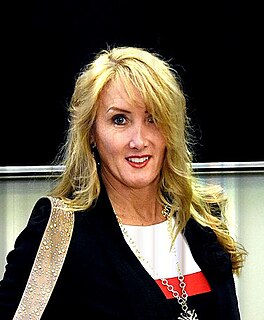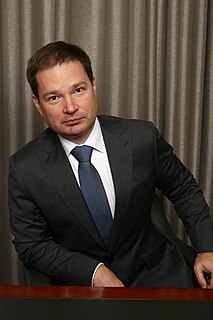Background
Donald Robinson and Sean Hollingsworth [2] were married in a civil ceremony in California and moved to New Jersey. They later decided to seek out a surrogate mother in order to have children of their own. In 2005, Robinson's sister, Angela Robinson, after falling on hard times and had moved to New Jersey to be near her brother, agreed to be a surrogate for the couple. Robinson later gave birth to twin girls in 2006. [2] Sean supplied the sperm and an anonymous donor supplied the egg. [2] Before the embryo was implanted, Robinson signed a contract stating she would carry the pregnancy to term and relinquish her parental rights in favor of her brother and Hollingsworth.
However, after the birth, Robinson claimed she was coerced into entering into the agreement and she felt uncomfortable with Robinson-Hollingsworth and Hollingsworth raising the children due to her religious beliefs against homosexuality. In 2007, she sought custody and challenged the agreement in court, arguing that gestational surrogacy contracts are invalid in New Jersey. [2]
Ruling and reaction
Judge Schultz ruled in favor of Angela Robinson, expanding the Baby M precedent beyond a genetically related surrogate mother and declaring gestational surrogacy contracts to be a violation of public policy. As noted by legal scholar Jonathan Turley, this ruling creates a split between those states that honor gestational surrogacy and those that do not. [4]
Attorney Harold Cassidy, who had represented both Robinson here and Mary Beth Whitehead in the Baby M case, praised the ruling and described gestational surrogacy contracts as "the exploitation of women." [1]
Despite finding that Angela Robinson was the legal mother of the twins, a 2011 ruling confirmed that the children's best interests would be served by awarding their father full legal custody - which was also the outcome in Baby M. The twins will continue to reside with Sean and his husband. [5]
Family law is an area of the law that deals with family matters and domestic relations.
Baby M was the pseudonym used in the case In re Baby M, 537 A.2d 1227, 109 N.J. 396 for the infant whose legal parentage was in question.

Surrogacy is an arrangement, often supported by a legal agreement, whereby a woman agrees to delivery/labour for another person or people, who will become the child's parent(s) after birth. People may seek a surrogacy arrangement when pregnancy is medically impossible, when pregnancy risks are dangerous for the intended mother, or when a single man or a male couple wish to have a child. Surrogacy is considered one of many assisted reproductive technologies.
The main family law of Japan is Part IV of Civil Code. The Family Register Act contain provisions relating to the family register and notifications to the public office.
Fertility tourism is the practice of traveling to another country or jurisdiction for fertility treatment, and may be regarded as a form of medical tourism. One can usually be considered as having fertility issues when they are unable to have a clinical pregnancy after 12 months of attempts with intercourse. Infertility, or the inability to get pregnant, affects about 8-12% of couples looking to conceive or 186 million people globally. In some places, rates of infertility surpass the global average and can go up to 30% depending on the country. Areas with lack of resources, such as assisted reproductive technologies (ARTs), tend to correlate with the highest rates of infertility.
Surrogacy in India and Indian surrogates became increasingly popular amongst intended parents in industrialised nations because of the relatively low costs and easy access offered by Indian surrogacy agencies. Clinics charged patients between $10,000 and $28,000 for the complete package, including fertilization, the surrogate's fee, and delivery of the baby at a hospital. Including the costs of flight tickets, medical procedures and hotels, this represented roughly a third of the price of the procedure in the UK and a fifth of that in the US. Surrogate mothers received medical, nutritional and overall health care through surrogacy agreements.
In the Goldman child abduction case David Goldman fought for his son Sean Goldman to be returned to the United States after his abduction by his mother to Brazil in 2004. After years of court battles, Sean was returned to his father five and a half years later in 2009. This case of international child abduction gained significant attention in the media and from U.S. politicians.

The legal aspects of surrogacy in any particular jurisdiction tend to hinge on a few central questions:
Law in Australia with regard to children is often based on what is considered to be in the best interest of the child. The traditional and often used assumption is that children need both a mother and a father, which plays an important role in divorce and custodial proceedings, and has carried over into adoption and fertility procedures. As of April 2018 all Australian states and territories allow adoption by same-sex couples.
Commodification of the womb is the process by which services performed by the female womb are offered for sale and purchased on the market. Basically it is commercial surrogacy viewed from a Marxian standpoint. The market transaction reduces the womb to merely a service provider in the marketplace. In Marxian terms, the womb in its commodified state has both exchange value and use value. Market transactions involving the services of women's wombs became increasingly common in the early twenty-first century. Such transactions are generally relied upon by those unable to conceive and those who are willing to pay someone else to bear pregnancy. Commodification of the womb raises several ethical and legal questions, which have expanded from questions regarding the rights of surrogates and biological parents, and the legitimacy of a child resulting from the transaction, to questions regarding transnational surrogacy within a global market.
In July 2014, an internationally publicised incident occurred in which a Thai woman, Pattaramon Janbua, who had been hired as a surrogate mother for an Australian couple, sought to raise money for her critically ill surrogate son. The baby had been in her care since she gave birth in December 2013; biological parents David John Farnell and Wenyu Wendy Li had left Thailand 2 months later with baby Gammy's twin sister Pipah.
Surrogacy is legal in New Zealand if it is performed altruistically, where the surrogate donates her services selflessly, without any compensation beyond the coverage of expenses. Commercial surrogacy, where the surrogate is paid in addition to the coverage of expenses, is not legal. There is a lack of specific legislation and regulations dealing with surrogacy, though the recent increase in surrogacy cases has led to a number of amendments. New Zealand is party to the United Nations Convention on the Rights of the Child, and ratified it in April 1993. The primary principle of this Convention is that the best interests of the child are paramount, which must then encompass all surrogacy agreements and regulations. The lack of clear surrogacy legislation in New Zealand has led to many couples engaging in reproductive tourism in order to ensure the surrogacy is successful. This has the potential to significantly impact the human rights of all of the parties involved.
e-baby is a two-hander play written by Jane Cafarella that was premiered at Chapel Off Chapel in Melbourne in 2015. It is set over a 16-month period in 2015–16 and deals with two women going through gestational surrogacy, the genetic mother of the embryo created by in vitro fertilisation, and the woman carrying the child. It has been described by Patricia Tobin as a "quietly feminist play that asserts a heartfelt approach towards matters of infertility, adoption and motherhood".

Rebecca Kiessling is an American anti-abortion activist and attorney. Her advocacy is focused on criminalizing abortion, including in the case of pregnancy from rape.
Louisa Maria Ghevaert is a solicitor of the Senior Courts of England and Wales.
Surrogacy is legal in Canada provided that it is altruistic (unpaid). The Assisted Human Reproduction Act of 2004 criminalizes commercial surrogacy. The validity of surrogacy contracts and the process for establishing parenthood of the child is governed by provincial law. Quebec fails to recognize any surrogacy contracts, whereas British Columbia has the most permissive laws governing surrogacy. Provinces also vary in the degree to which they compensate surrogacy expenses, such as IVF procedures.
Susan GolombokFBA is Professor of Family Research and Director of the Centre for Family Research at the University of Cambridge, and Professorial Fellow at Newnham College, Cambridge. Her research on new family forms has contributed to theoretical understanding of family influences on child development and has addressed social and ethical issues that are of relevance to family life.
Circle Surrogacy & Egg Donation is a US-based surrogacy and egg donation agency headquartered in Boston, Massachusetts. Circle Surrogacy carries an audited success rate for intended parents having a baby at 99.3%.

Konstantin N. Svitnev is an international reproductive lawyer of Russian origin. Svitnev was born in 1966 and grew up in Moscow. Svitnev spent much of his legal career as an advocate for gender equality and reproductive rights...
In a Child's Name is a four-hour mini-series televised on CBS in 1991. Baby Andrew's mother was murdered by his father and a custody battle ensues between the father's parents and the dead mother's sister played by Valerie Bertinelli.




